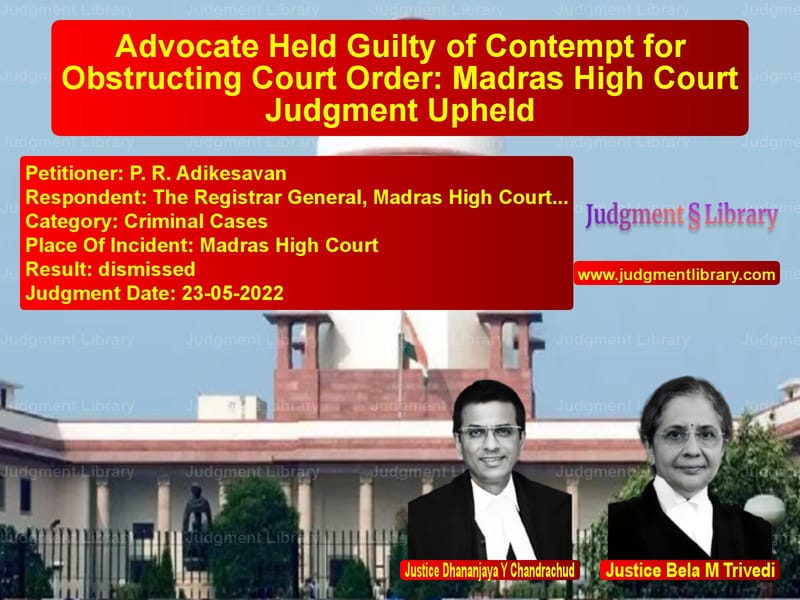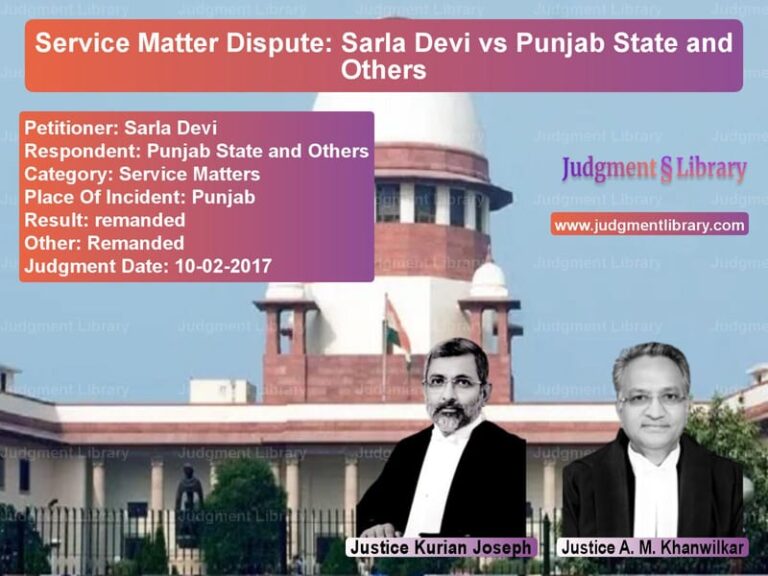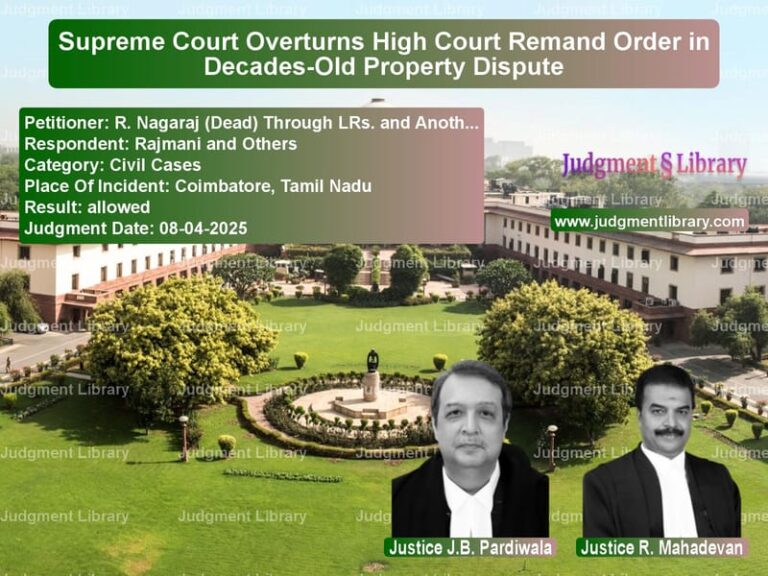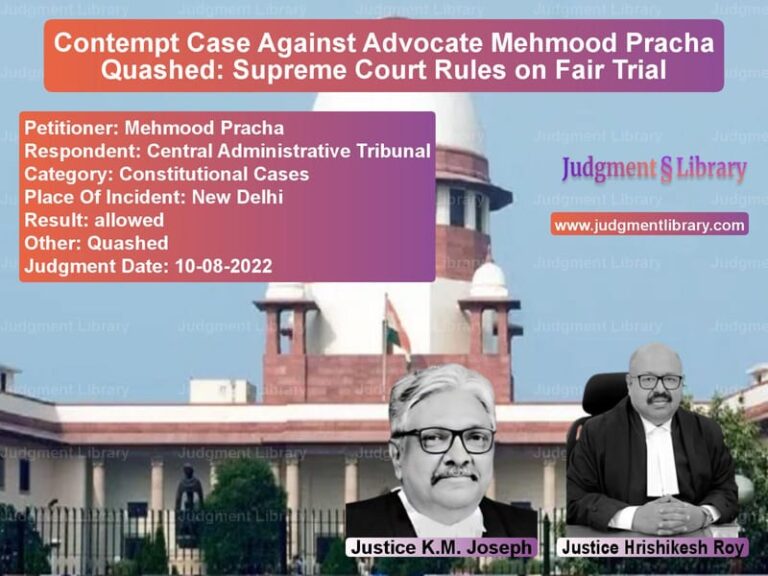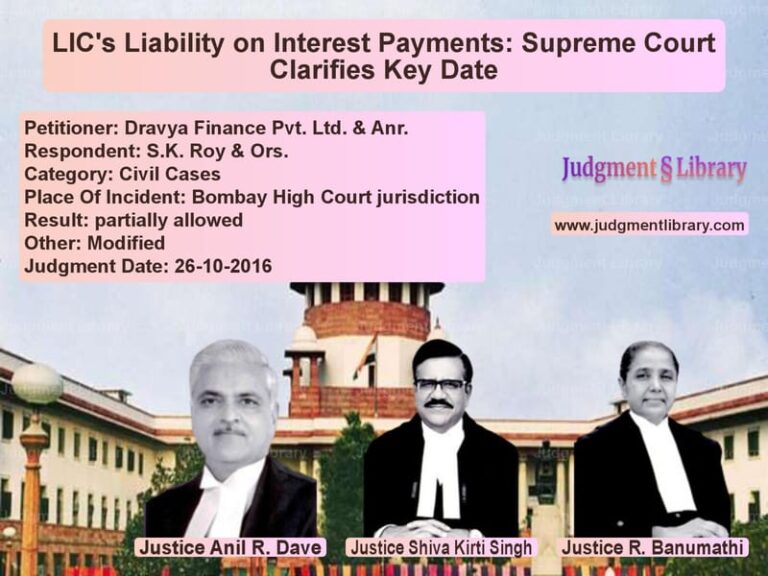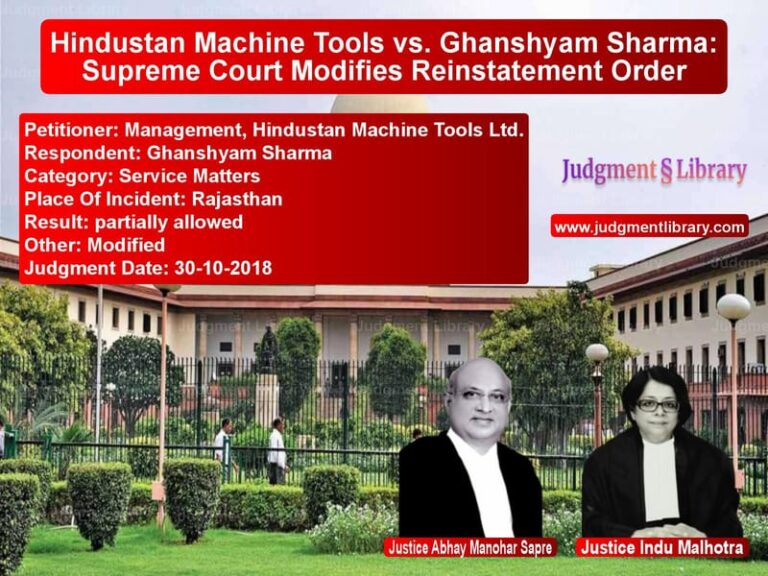Advocate Held Guilty of Contempt for Obstructing Court Order: Madras High Court Judgment Upheld
The case before the Supreme Court revolved around an advocate, P. R. Adikesavan, who was found guilty of contempt of court for obstructing the execution of a non-bailable warrant issued against him in an insolvency proceeding. The case highlights the importance of judicial respect and the legal consequences of obstructing the administration of justice. The Supreme Court upheld the decision of the Madras High Court, imposing a two-week simple imprisonment sentence and barring the appellant from practicing as an advocate in the High Court for one year.
Background of the Case
The case stems from insolvency proceedings initiated against P. R. Adikesavan under the Presidency Towns Insolvency Act, 1909. As part of these proceedings, a Single Judge of the Madras High Court issued a non-bailable warrant against him on 12 March 2021, directing him to appear in court on 26 March 2021.
However, when the police attempted to execute the warrant on 31 March 2021, the appellant, along with approximately fifty advocates, prevented the police from carrying out their duty. This incident was captured on video and later reported to the Registrar General of the Madras High Court. In response, contempt proceedings were initiated against the appellant.
Read also: https://judgmentlibrary.com/murder-conviction-reduced-to-culpable-homicide-a-legal-analysis/
Charges Against the Appellant
The appellant was charged with the following violations:
- Interfering with the administration of justice by preventing police officials from executing a non-bailable warrant.
- Leading a group of advocates to obstruct law enforcement from carrying out the court’s orders.
- Attempting to undermine the judicial process by refusing to comply with legal directives.
- Making allegations against the judiciary and seeking the recusal of judges to delay the proceedings.
Arguments Presented
Prosecution’s Arguments (Madras High Court)
- The appellant actively obstructed the police while they were executing a valid non-bailable warrant.
- The appellant’s actions constituted criminal contempt under the Contempt of Courts Act, 1971.
- The video footage of the incident clearly showed the appellant and other advocates preventing the police from performing their duty.
- The appellant refused to appear in court despite being fully aware of the pending proceedings.
- The appellant made false allegations against judges and filed applications for recusal to delay the proceedings.
- He deliberately sought multiple adjournments to obstruct and prolong the case.
Appellant’s Arguments
- The appellant had filed an unconditional apology and requested the court to accept it.
- His actions did not amount to contempt, as he was merely exercising his legal rights.
- He had filed applications seeking the recusal of judges due to bias, which was within his rights.
- The punishment awarded by the High Court was excessive and should be reduced.
Observations by the Supreme Court
The Supreme Court ruled against the appellant, highlighting the following key observations:
- The appellant was clearly guilty of obstructing justice and preventing law enforcement from carrying out a court order.
- The video evidence conclusively proved that he led a group of advocates to stop the police from executing the warrant.
- The appellant repeatedly sought adjournments to delay proceedings and filed applications to remove judges without valid grounds.
- His attempt to withdraw these applications from the court registry further showed his intention to manipulate the judicial process.
- The punishment awarded by the High Court was proportionate to his actions.
Key Excerpts from the Judgment
The Supreme Court made several important remarks in its judgment:
“The behavior and conduct of the appellant, who is a member of the Bar, has been thoroughly contemptuous. There was a clear attempt to obstruct the process of justice when the non-bailable warrant was sought to be served on him by the competent police officials, which has been recorded in the video footage.”
The Court further observed:
“The appellant has no respect for the administration of justice. The finding of contempt, as well as the sentence, cannot be regarded as disproportionate.”
Final Verdict
The Supreme Court upheld the decision of the Madras High Court and dismissed the appeal. The appellant was:
- Sentenced to two weeks of simple imprisonment.
- Fined Rs. 2,000.
- Barred from practicing as an Advocate in the Madras High Court for one year.
The Court emphasized that such actions, especially by members of the legal profession, undermine the rule of law and erode public confidence in the judiciary. The ruling sends a strong message regarding the consequences of obstructing the judicial process.
Outcome: The Supreme Court ruled that the appellant’s actions were a serious breach of legal ethics and judicial respect, reinforcing the importance of upholding the sanctity of the legal system.
Petitioner Name: P. R. Adikesavan.Respondent Name: The Registrar General, Madras High Court & Another.Judgment By: Justice Dhananjaya Y Chandrachud, Justice Bela M Trivedi.Place Of Incident: Madras High Court.Judgment Date: 23-05-2022.
Don’t miss out on the full details! Download the complete judgment in PDF format below and gain valuable insights instantly!
Download Judgment: p.-r.-adikesavan-vs-the-registrar-genera-supreme-court-of-india-judgment-dated-23-05-2022.pdf
Directly Download Judgment: Directly download this Judgment
See all petitions in Contempt Of Court cases
See all petitions in Legal Malpractice
See all petitions in Judgment by Dhananjaya Y Chandrachud
See all petitions in Judgment by Bela M. Trivedi
See all petitions in dismissed
See all petitions in supreme court of India judgments May 2022
See all petitions in 2022 judgments
See all posts in Criminal Cases Category
See all allowed petitions in Criminal Cases Category
See all Dismissed petitions in Criminal Cases Category
See all partially allowed petitions in Criminal Cases Category

